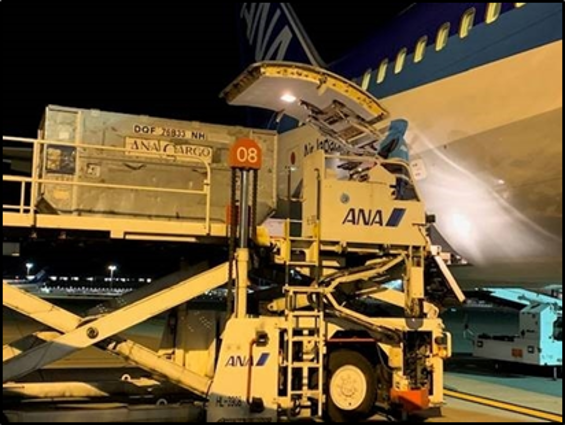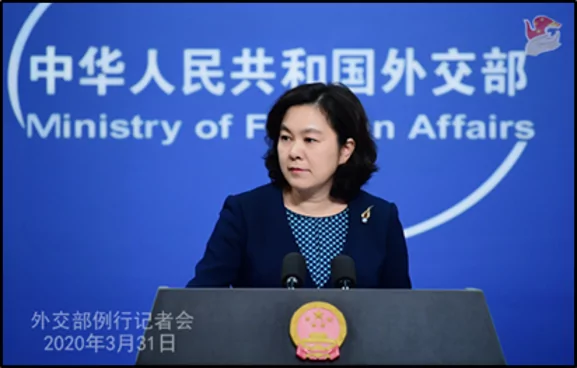
“Land Apart, Shared Sky”: Sino-Japanese Relations Amid the COVID-19 Pandemic
Publication: China Brief Volume: 20 Issue: 9
By:

Introduction
Over the last several years, Sino-Japanese relations have registered steady progress. Despite the intensified international criticism directed toward the government of the People’s Republic of China (PRC) for its handling of the COVID-19 pandemic, the administrations in both Beijing and Tokyo seem keen to maintain this newfound status quo. Russia, Cambodia, and a number of the PRC’s traditional partners commended the country for its responsible handling of the health crisis; however, few would have expected Japan to be among them. As reported in PRC press, during a January phone call with PRC Foreign Minister Wang Yi (王毅), his Japanese counterpart Toshimitsu Motegi praised China’s “positive and powerful measures” to control the virus “under the leadership of President Xi Jinping,” and expressed its willingness to be a “friend in need” (PRC Foreign Ministry, January 26). Umeda Hiroshi, an official from the Japanese Ministry of Health and Welfare, even condemned the rumor that China was deliberately spreading the virus, arguing that such statements are “violating China’s human rights” (NHK, February 2). Later, when more countries woke to the devastating effects of the virus and held Beijing responsible for a coverup and lack of transparency, the Japanese government remained silent.
The cordial meeting between PRC President Xi Jinping and Japanese Prime Minister Abe Shinzo in Beijing last December (Japan Times, December 23, 2019) contrasted sharply to their meeting during the 2014 APEC summit, remembered particularly for the awkward handshake indicative of the sour bilateral relations at the time. Subsequently, the successful holding of the 8th China-Japan-South Korea summit in Chengdu in late December 2019—which included a meeting between Abe and PRC Premier Li Keqiang—signaled further positive developments (PRC Foreign Ministry, December 24, 2019). President Xi’s scheduled visit to Japan this spring—the first since Hu Jintao’s visit in 2008—has been postponed due to the pandemic, but also underscores the recent improvement in bilateral relations. Amid these circumstances both governments have chosen to maintain friendly relations, regardless of the virus outbreak and other incidents that in the past might have unleashed nationalistic fervor.
Helping China: “A National Effort” for Japan
During an interview on January 28, Nikai Toshihiro, Secretary-General of the ruling Liberal Democratic Party (LDP), pledged “a national effort” to assist China (Xinhua, February 8). From January 28 to February 17, Japan sent five charter flights of medical aid—containing over 6.3 million masks, 1 million pairs of gloves, 22,900 sets of protective gear, 83,200 pairs of goggles, 16,000 thermometers and 1.15 tons of disinfectant—to Wuhan alone to help ease the supply shortage (Embassy of Japan in China, February 7, February 17). In a powerfully symbolic move, Nikai even announced on February 10 that every LDP party member, including Prime Minister Abe, was to incur a pay cut of $47 (5000 yen) and donate the money collected to relief efforts in China (Xinhua, February 17).
Notably, diverse public and private actors in central and local governments, companies, and civil organizations, as well as private individuals, have participated in this “national effort.” More than sixty local governments in Japan have sent aid to their Chinese counterparts (Embassy of Japan in China, February 6). Oita, the sister city of China’s epicenter Wuhan, acted quickly on January 27 to donate 30,000 masks, 600 sets of protective gear, and 400 goggles, and also arranged several fund-raising events afterwards (Embassy of People’s Republic of China in Japan, February 4). Businesses and other civil organizations have also followed suit. Honda, Toyota, and Suzuki, the “big three” Japanese automobile manufacturers, all offered financial donations to China. Canon donated a piece of medical CAT scan equipment worth more than $400,000 to Wuhan (Embassy of Japan in China, February 7).
Some of the Japanese aid packages included poetic lines that captured the Chinese public’s attention. Aid packages from the HSK Chinese proficiency test center, organized under the Japanese Youth Development Association, included notes that read: “Lands Apart, Shared Sky” (山川异域,风月同天) (Beijing News, February 3). Other organizations, often led by ethnic Chinese in Japan, also adopted phrases like “Fear not the want of armor, for mine is also yours to wear” (岂曰无衣,与子同裳); “Though separated by a mountain, we will share the same clouds and rain / The bright moon belongs not to a single town” (青山一道同云雨, 明月何曾是两乡); and “Liao River thaws, while flowers bloom in Toyama / Of the same breath and from joint branches, we hope together for the spring to come soon” (辽河雪融,富山花开;同气连枝,共盼春来) (Xinhua, February 15).
Regardless of their source of origin, the poetry has been often attributed to Japan. The responses from Chinese netizens have since been overwhelmingly positive, best epitomized in a Weibo user’s post: “A friend in need is a friend indeed, neither Japanese nor South Korea are that evil as we once deemed” (患难之际见人性,日韩原来非寇仇) (Sina Weibo, February 8). Asked about the Japanese aid, PRC Foreign Ministry spokeswoman Hua Chunying (华春莹) underlined the “sympathy, understanding and support” received from the Japanese government and its people, and noted that Chinese netizens have well received these developments (PRC Foreign Ministry, February 4). Even nationalist PRC news outlets expressed appreciation for the support received from Japan, and commented on the thawing of both people-to-people and government-to-government relations (Huanqiu Wang, January 29; Global Times, February 9).
China’s “Deepened Friendship” with Japan
China responded to Japan’s aid efforts not only with verbal recognition of the “deepened friendship” that “China will remember and hold dear” (PRC Foreign Ministry, February 21, February 16), but also with aid when the outbreak later erupted in Japan. PRC Foreign Ministry spokesman Geng Shuang (耿爽) pledged to help Japan “to the best of our capabilities as the need arises” (Chinese Foreign Ministry, February 17). China has indeed sent aid to Japan, including masks and test kits (Global Times, March 29). The exchanges between sister cities again stood out. For example, Wuxi and Changzhou, two cities in Jiangsu Province, each donated more than 50,000 masks to their sister cities Toyokawa and Tokorazawa, respectively (NHK, April 15; BBC, March 28).
When Japan faced a dire situation involving the stranded cruise ship Diamond Princess, the Chinese government ordered a batch of testing kits that were later donated to the National Institute of Infectious Diseases of Japan (PRC Embassy in Japan, February 20). Jack Ma, the Chinese billionaire recently renowned for his charitable undertakings in fighting the virus, also donated one million masks to Japan through his foundation, which was returned with Nikai’s letter expressing sincere gratitude (Huanqiu Wang, March 3).
A Softer Tone Regarding Sovereignty Claims in the East China Sea
More importantly, events that in different circumstances would have derailed bilateral relations have now been downplayed by Beijing. When on March 24, the Japanese government approved new school textbooks claiming sovereignty over the disputed Diaoyu Islands (called the Senkaku Islands in Japan) in the East China Sea, PRC officials expressed a moderate tone than relative to other instances in the past. Though PRC Foreign Ministry spokesman Geng Shuang still adopted a standard response in stating that the “Diaoyu Island and its affiliated islands have been China’s inherent territory since ancient times,” this was not reiterated as forcefully as seen in the past. Historical incidents were not invoked to promote nationalism, and People’s Daily and Xinhua both kept quiet on the matter (PRC Foreign Ministry, March 24).

In a different instance, responding to the March 30 collision between a Chinese fishing boat and a Japanese SDF destroyer in East China Sea, PRC Foreign Ministry spokeswoman Hua Chunying asserted that “the collision occurred in the coastal waters of China,” and that “the Chinese side has expressed concern to the Japanese side over the Japanese SDF warship sailing in the relevant waters and endangering the safety of the Chinese vessel.” However, Hua adopted a moderate tone, and stated that “We are in communication with the Japanese side over this and hope they will cooperate to determine the cause as soon as possible and prevent such incidents from happening again” (Chinese Foreign Ministry, March 31). Coverage of the incident was either censored in China, or simply reported briefly and objectively both in China and Japan (Beijing Daily Online, March 31; The Japan Times, March 31). This contrasted sharply with a 2010 incident in which a Chinese trawler collided with a Japanese Coast Guard vessel, leading to the detention of the Chinese crew and the suspension of high-level bilateral contacts (People’s Daily Online, September 7, 2010).
Similarly, when in April the Japanese government offered a $2.2 billion stimulus package to Japanese companies willing to relocate their production out of China, PRC Foreign Ministry spokesman Zhao Lijian (赵立坚), generally known for inflammatory responses, simply commented: “We hope other countries can also take measures to avoid further impacts on the world economy and global supply chains… We need to make concerted efforts to safeguard the stability of global supply chains and bring the world economy back onto the normal track” (PRC Foreign Ministry, April 8). This stands in stark contrast with Beijing’s fury toward several countries that closed their borders and ceased trade, accusing them of setting a “bad example” due to “fear and overreaction” (PRC Foreign Ministry, February 3).
Conclusion: Effective Diplomacy, Unknown Future
The Sino-Japanese diplomatic relationship continues to see ups and downs. On April 13, spokesman Zhao Lijian angrily protested against a report by the Japanese newspaper Yomiuri Shimbun, which blamed the Chinese Communist Party and Chinese government for the global pandemic, calling it “ignorance, prejudice, and arrogance” (PRC Foreign Ministry, April 13). In one of the latest high-level exchanges between the two foreign ministers, on April 21 Wang Yi reiterated to his counterpart Toshimistu Motegi China’s appreciation for Japan’s early support amidst the COVID-19 epidemic, and expressed Beijing’s willingness to continue to support Tokyo. He reportedly cautioned, however, against “the ‘political virus’ that breeds division and hatred” and attempts to “blame and discredit China” (PRC Foreign Ministry, April 21). Wang’s statement is a warning that bilateral relations could still abruptly sink to a new low.
Regardless of such frictions, since the outbreak of COVID-19 Japan has aimed to preserve warm bilateral ties with the PRC. Multiple state and non-state actors have contributed to relief efforts through a combination of substantial donations and expressive gestures, such as offering donations deducted from politicians’ salaries and attaching poems to aid packages. So far, these measures have been well received by both Chinese officials and the public. Despite this encouraging trend, however, an overly positive prediction of future Sino-Japanese relations could be premature. As the pandemic in Japan expands, Abe could be forced to change tack; and should Japan join countries like the United States in blaming China for the outbreak’s extensive spread, Beijing is likely to retaliate.
Dr. Oana Burcu is an Assistant Professor in Contemporary Chinese Studies and Fellow of the Asia Research Institute in the School of Politics and International Relations at the University of Nottingham, UK. She specializes in Chinese foreign policy, Sino-Japanese relations, and the impacts of nationalism on regional geopolitics.
Weixiang Wang is a Master’s student and future doctoral candidate in the School of Politics and International Relations at the University of Nottingham, UK.



